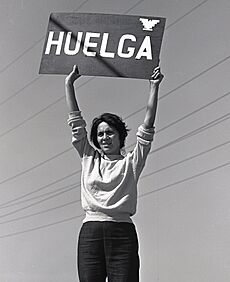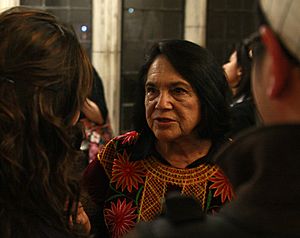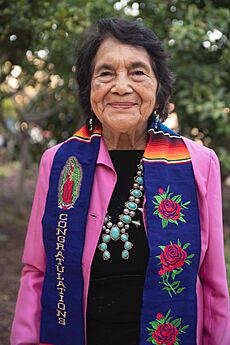Dolores Huerta facts for kids
Quick facts for kids
Dolores Huerta
|
|
|---|---|
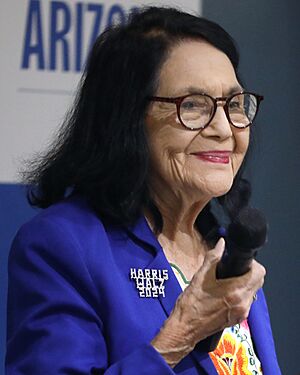
Huerta in 2024
|
|
| Born |
Dolores Clara Fernández
April 10, 1930 Dawson, New Mexico, U.S.
|
| Alma mater | San Joaquin Delta College |
| Known for |
|
| Political party | Democratic |
| Spouse(s) |
|
| Partner(s) | Richard Chavez (deceased) |
| Children | 11 |
| Parent(s) | Juan Fernández (father) |
Dolores Huerta (born April 10, 1930) is an American leader who has worked for better rights for workers and women. She helped start the National Farm Workers Association (NFWA) with Cesar Chavez. This group later joined with another to become the United Farm Workers (UFW).
Huerta was a key organizer of the Delano grape strike in 1965. She helped lead boycotts and talked with grape companies to end the strike. Many people say she created the famous UFW saying, "sí se puede" which means 'yes you can'.
Over time, Dolores Huerta became a strong supporter of women's rights. She worked with the Feminist Majority Foundation to help Latina women get more involved in politics. She also supported women's health choices and was a leader for the 2017 Women's March in Washington, D.C.
In 2002, she started the Dolores Huerta Foundation (DHF). This group helps people get involved in their communities. She is also active in politics and has supported many leaders. She stands up for LGBTQ rights and changes to immigration laws.
Dolores Huerta has received many awards for her work. These include the Eleanor Roosevelt Human Rights Award and the Presidential Medal of Freedom in 2012. In California and Oregon, April 10 is now known as "Dolores Huerta Day" to honor her birthday.
Contents
Early Life and Education
Dolores Huerta was born on April 10, 1930, in Dawson, New Mexico. Her father, Juan Fernández, was a coal miner and a union member. Her parents divorced when she was five years old. Dolores and her mother moved to California, first to Las Vegas, Nevada, and then to Stockton, California.
In Stockton, Dolores was raised by her mother and grandfather. Her neighborhood was diverse, with people from many different backgrounds. Her mother worked hard to support the family, first as a canner and waitress, then by opening a restaurant. Her mother was also part of a union and bought a hotel that served farm workers.
Dolores was a Girl Scout for ten years. She graduated from Stockton High School in 1947. After high school, she married Ralph Head and had two children. They later divorced. She then went to Stockton College (now San Joaquin Delta College) and became a teacher in 1953.
In 1954, Dolores became a teacher in a rural area of California. She saw that many of her students were hungry and needed clothes. This made her feel that she could do more to help by organizing farm workers. She believed that helping their parents would also help the children.
Joining the Community Service Organization
In 1955, Dolores Huerta met Fred Ross, who helped start the Community Service Organization (CSO). The CSO worked to improve life for people in their communities. Dolores joined the CSO and at first took on roles like helping with women's clubs. But Fred Ross encouraged her to take on bigger leadership roles.
By the late 1950s, she was starting new CSO groups and speaking to lawmakers. She worked to get retirement benefits for non-citizens and health care for farm workers. She also helped with neighborhood projects and voter registration. While working with the CSO, she met her second husband, Ventura Huerta, and they had five children. She also met Cesar Chavez, who would become her important partner in organizing.
Working for Farm Workers' Rights
Starting the Union
In 1958, Dolores Huerta helped create the Agricultural Workers' Association (AWA). Later, in 1962, she and Cesar Chavez started the National Farm Workers Association (NFWA). She stayed in Stockton at first, while Cesar set up the main office in Delano. Her marriage to Ventura ended in 1963.
Dolores later left her job with the CSO and moved to Delano in 1964 to work full-time with the NFWA. Cesar Chavez said her role was "critical" in the early days of the union. She made phone calls, collected union dues, and visited worker camps. It was hard to earn enough money, so she also worked as a translator and substitute teacher. In 1965, she helped the NFWA organize a strike for rose workers, which led to higher wages for them.
The Delano Grape Strike
On September 8, 1965, another union, the Agricultural Workers Organizing Committee (AWOC), started a strike at grape farms in Delano. Their leader, Larry Itliong, asked Cesar Chavez and the NFWA for help. On September 16, the NFWA decided to join the strike.
The strike also included boycotts, where people refused to buy grapes. Dolores Huerta helped organize these boycotts. She went to New York and New Jersey to lead efforts there. She worked with local groups, churches, and students to convince grocery stores to stop selling grapes. Many stores, like A&P, soon stopped selling them. Dolores often spoke in public about the strike, becoming known for her strong speeches.
On August 19, 1965, the AWOC and NFWA joined together to form the United Farm Workers (UFW). Dolores Huerta became a vice president of the new union. She was one of the main people who talked with the grape companies. In 1966, she helped get good contracts for workers with several companies. When the strike ended in 1970, Dolores helped get a contract that raised workers' pay, added safety rules for pesticides, created a health fund, and gave the union more say in hiring.
Continuing Union Work
In the 1970s, Dolores Huerta helped organize more boycotts, including for lettuce and Gallo wine. She also started a family with Richard Chavez, Cesar's brother, and they had four children. Dolores, Richard, and another organizer worked to help workers in California's Central Valley. In 1975, she helped pass the California Agricultural Labor Relations Act (ALRA). This was the first law in California to give farm workers the right to form unions and bargain for their rights.
Dolores Huerta continued to work for the UFW, raising money and giving speeches. She also spoke to the U.S. Congress about farm workers' pay, benefits, and health. In 1988, she was hurt by a police officer during a protest in San Francisco. She had serious injuries and later received money as a result. This event also led to changes in how the San Francisco Police Department handled protests.
After recovering, Dolores took a break from the UFW. She returned after Cesar Chavez passed away in 1993, helping strawberry workers and speaking at colleges. She stepped down as UFW vice president in 1999 to work on other important causes.
Working for Women's Rights
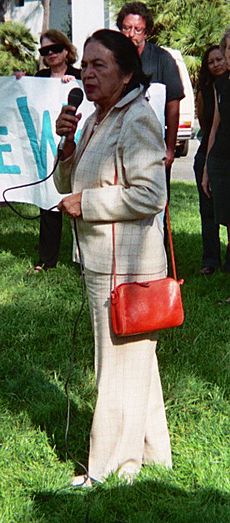
At first, Dolores Huerta thought that women's rights movements were mostly for middle-class women. But she later changed her mind and became a strong supporter of women's rights. In a 1976 interview, she called herself a feminist. By 1985, she called herself a "born-again feminist" as she thought more about women's issues.
During her time away from the UFW after her injury, she worked with the Feminist Majority Foundation (FMF). This group works for women's equality. As part of their "Feminization of Power" campaign, she encouraged Latina women to run for political office. She continued this work even after she retired from the UFW in 1999.
In 2014, Dolores Huerta campaigned in Colorado against a law that would have changed how "unborn human beings" were defined. The law was defeated. She also served as a leader for the 2017 Women's March in Washington, D.C. This march protested concerns about women's rights.
Dolores Huerta Foundation
Dolores Huerta is the president of the Dolores Huerta Foundation (DHF). She started this organization in 2002 in Bakersfield, California. She used money from an award she received to begin the foundation. Dolores says the DHF continues the non-violent civil rights work of the 1970s. Its goal is to help people get involved in their communities and in democracy.
The DHF helps create "Vecinos Unidos" (which means 'United Neighbors') groups. These groups teach local people how to work together, talk with government officials, and make changes in their communities. By 2016, these groups were active in many rural California towns. In 2020, the DHF's leader said that Vecinos Unidos groups had helped raise "millions of dollars" for things like road repairs, sidewalks, and streetlights.
In 2016, the DHF was part of a lawsuit against the Kern High School District. They said that Black and Latino students were unfairly disciplined. The district agreed to changes, and the DHF now helps watch to make sure the district ends unfair practices. In 2025, the DHF started building the "Peace and Justice Cultural Center" in Kern County. This center will help with civic education and community organizing.
Political Views
Supporting Democratic Politics
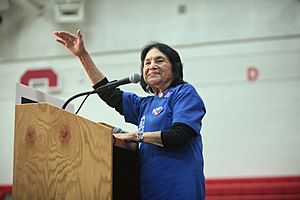
Dolores Huerta is a leader for the Democratic Socialists of America. In 1968, she and the UFW supported Robert F. Kennedy for president. She was there when he was assassinated, calling it "the death of our future." She also worked on campaigns for other Democratic leaders like George McGovern, Al Gore, Howard Dean, Hillary Clinton, Kamala Harris, and Joe Biden.
During the 2016 Democratic primaries, she supported Hillary Clinton. She also supported Kamala Harris in the 2020 and 2024 elections, saying Harris "fights relentlessly for Latino communities, working families, and for every American."
LGBTQ+ Rights
The UFW generally supported LGBTQ rights in the 1960s and 70s. Dolores Huerta has spoken out against discrimination based on sexual orientation. In a 2006 speech, she supported same-sex marriage. She said that respecting other people's rights leads to peace.
In 2005, she worked to pass a bill that would have made same-sex marriage legal in California. She also spoke at a pride celebration in Fresno in 2021, saying that negative talk against LGBTQ+ people can lead to violence. In 2024, the Dolores Huerta Foundation supported a law that removed old language about marriage from the California constitution and confirmed marriage as a "fundamental right." This law passed.
Immigration Views
Dolores Huerta is known for being "pro-immigrant." In 1994, she campaigned against a California law that would have denied healthcare and education to undocumented immigrants. She said this law was based on "racial anxiety." She also spoke against changes to the DACA policy and protested the family separation policy in 2018. She supports a "comprehensive immigration reform plan."
Some people have criticized Huerta and the UFW for certain actions related to undocumented workers in the past. However, her overall work has been to support and advocate for immigrant communities.
Awards and Honors
Dolores Huerta has received many awards for her important work. In 1984, the California State Senate named her "Outstanding Labor Leader." She received the Eleanor Roosevelt Human Rights Award in 1988. In 1993, she was the first Latina woman to be added to the National Women's Hall of Fame. Ms. magazine named her "Woman of the Year" in 1998.
In 2000, she received the Hispanic Heritage Award. In 2012, she was given the Presidential Medal of Freedom, which is the highest award a civilian can receive from the U.S. president. In 2015, the Mexican Government gave her the Order of the Aztec Eagle, their highest award for foreigners.
In 2018, California Governor Jerry Brown signed a law making April 10 "Dolores Huerta Day" in California. Oregon also made April 10 Dolores Huerta Day in 2019. In 2020, she received the Ripple of Hope Award.
Dolores Huerta has also received special degrees from several universities. Many schools are named after her, including elementary and middle schools. A street intersection in Los Angeles is named Dolores Huerta Square, and a highway in Texas is named in her honor. Even an asteroid, 6849 Doloreshuerta, is named after her!
Images for kids
-
Speaking at a rally in Santa Barbara, California on September 24, 2006
-
Dolores Huerta speaking at a Hillary Clinton campaign rally with former President Bill Clinton at Central High School in Phoenix, Arizona
See also
 In Spanish: Dolores Huerta para niños
In Spanish: Dolores Huerta para niños
- Cesar Chavez
- History of Mexican Americans
- Larry Itliong
- List of civil rights leaders
- List of Mexican Americans
- List of people from Stockton, California
- List of Presidential Medal of Freedom recipients
- List of Scouts
- Mily Treviño-Sauceda
- Philip Vera Cruz
 | Sharif Bey |
 | Hale Woodruff |
 | Richmond Barthé |
 | Purvis Young |


